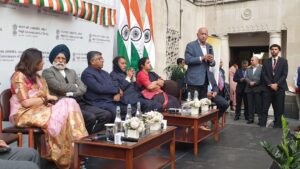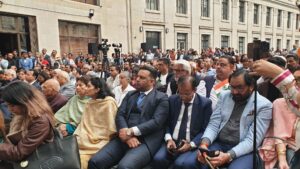
M Ghazali Khan
London: One of the delegations sent by the Modi government around the world following Operation Sindhoor has arrived in the United Kingdom. The Indian High Commission organised a gathering for this delegation in the open courtyard of India House, where members addressed the Indian diaspora.
The nine-member delegation is being led by BJP Member of Parliament Ravi Shankar Prasad, who also conducted the meeting.
The delegation includes Rajya Sabha MP from Jammu & Kashmir Ghulam Ali, Congress’s Sikh MP Amar Singh, and renowned journalist M.J. Akbar.
The delegation members gave passionate speeches, repeating many familiar points about the Pakistani military, the very issues that have brought Pakistan international notoriety. So, it’s unnecessary to detail who said what; such coverage can be easily found in the Indian media.
However, one point is worth mentioning: the contrast in courage between Sikh and Muslim politicians in India.
While referring to Pakistani terrorism and the military’s role in it, Ravi Shankar Prasad also highlighted the suppression of democracy in Pakistan and the imprisonment of politicians. When Amar Singh took the stage, he jokingly addressed Prasad, saying, ‘When it comes to putting people in jail, you’re no less than anyone else.’
Though said in jest, this remark shows a level of boldness that invites comparison, for instance, with the statements made by ‘Khaid-e-Azam’ Asaduddin Owaisi Sahib during his tour of Gulf countries, regarding the condition of Muslims and communalism in India.

In any case, this is not the first example of Sikh courage. After Operation Blue Star, the reaction of Giani Zail Singh was described in detail by Mark Tully in his book ‘Amritsar: Mrs Gandhi’s Last Battle.’ Similarly, despite not being a religious person, Khushwant Singh’s decision to return the Padma Bhushan award is also a notable historical event.
Unlike this event, High Commission gatherings are generally smaller and often include time for a question-and-answer session afterwards.
Had there been such a session and had I been given the opportunity, I would have asked this: Why is the significant shift in Owaisi Sahib’s statement—that his differences with the ruling party are minor—Nishikant Dubey’s comment that there is no issue between minorities and the majority in India, and the sudden softening of positions regarding support for Palestinians, not reflected within India itself, where lynchings and bulldozer justice continue? Unfortunately, no time was allocated for questions or discussion at the event.
During emotional speeches, slogans such as ‘Bharat Mata Ki Jai,’ ‘Vande Mataram,’ and ‘Jai Shri Ram’ were raised. Hearing these slogans reminded me of the incident at Aligarh Muslim University during the tenure of former Vice Chancellor Dr. Tariq Mansoor, when, during the NCC parade on 26 January 2023, a student chanted ‘Allahu Akbar’.
Making a mountain out of a molehill, Hindutva elements, including the BJP Member of Parliament from Aligarh, raised a storm, demanding immediate action against the student. A video of the BJP MP’s threatening phone call to the Vice Chancellor went viral on social media at the time. You can get an idea of the intense media backlash from a few of the headlines from that incident:
‘Religious slogans raised outside Aligarh Muslim University during Republic Day event, police order action’ (India Today 27 Jan 2023)
‘AMU suspends student for raising “Allah hu Akbar” slogans on Republic Day, investigation team formed for further probe’ (OpIndia, 23 28 Jan 2023)
AMU: ‘NCC’ students raise Allah-hu-Akbar slogans in response to “Vande Mataram” chants on Republic Day’ (Times Now, 27 Jan 2023)
